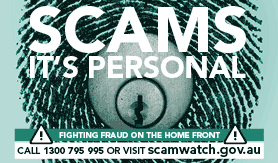National Consumer Fraud Week
 Next week, the Australian Competition and Consumer Commission (ACCC) and the Australasian Consumer Fraud Taskforce (ACFT) launch National Consumer Fraud Week. This year the theme is Scams: It’s Personal and Microsoft Australia are proud to support the initiative.
Next week, the Australian Competition and Consumer Commission (ACCC) and the Australasian Consumer Fraud Taskforce (ACFT) launch National Consumer Fraud Week. This year the theme is Scams: It’s Personal and Microsoft Australia are proud to support the initiative.
This time last year, I wrote about a scam that had been targeting Australian consumers by calling them at home claiming to be from or working on behalf of Microsoft or other large Australian corporations. They then attempt to scam people out of money by claiming that minor computer system alerts are more serious than they are. This blog post seemed to really resonate with a lot of people and continues to get a lot of comments. Given that these fraudsters are still actively targeting Australian consumers it seems pertinent to give an update on what we are seeing. We have received reports that they are widening their scope to include PC, Mac and Linux users. There have been numerous articles in the press reporting this scam, which is helping to drive consumer awareness.
Microsoft is still receiving reports on a daily basis from people who have fallen prey to the scam, parting with sums of money up to $400. After receiving a phone call at home from a company claiming to be representing Microsoft (or other well know companies) they are told that there is something wrong with their PC. Using classic scamming methods including high pressure sales tactics, the cold caller convinces the victim to allow them to take remote access of their PC to ‘fix’ the problems. Ultimately the scammer then gets the target to agree to pay for their ‘services’ over the phone on a credit card.
Whilst we continue to work closely with law enforcement and government agencies around the globe, these fraudsters are using social engineering tactics to convince people to hand over.
Our advice continues to be that anyone who receives such a call should bear in mind that Microsoft does not cold call consumers nor pass contact details onto third parties to do so. If in doubt, hang-up. If someone came to your door making similar claims, you would be highly unlikely to invite them in and give them access to your PC, the same should apply for unsolicited phone calls. If you have provided your credit card details as a result of such a call, please get advice from your bank immediately. In the short term, you may be able to stop the transaction. Longer term, you may want to cancel the card and get another one.
The best way we can help protect more people falling victim to this scam is to keep raising awareness of the issue. Please make sure you let friends and family know that this is happening and what to do should they receive a call. If you have been a victim of this scam and have concerns about the security of your PC, Microsoft provides free security support to consumers impacted by this issue on telephone number: 13 20 58.
Also check our security site for updates on the latest scams.
Stuart Strathdee, Chief Security Adviser, Microsoft Australia